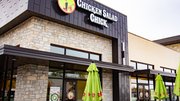Blog
How license, permit knowledge can save your restaurant
One expert gives five tips regarding permits and licenses to help restaurant owners avoid long-term fines and sanctions.

September 2, 2016
By Jennifer Friedman, VP of Wolters Kluwer’s BizFilings
It takes eight business licenses to open a restaurant in San Francisco but 14 to do the same thing in Chicago, and missing even one license can result in significant fines and penalties. Restaurant owners have to deal with seemingly endless issues from staffing to suppliers to the menu. One of the most critical — yet confusing — steps is licensing.
License requirements are derived from federal, state, county and local regulations that differ dramatically between regions. Industry data suggests that business owners can spend up to 20 hours researching their licensing requirements, and that’s time spent just at the beginning of the process — permits and licenses require regular renewals.
Along with incorporating your business, getting the required licenses and permits is a key early step on the path to restaurant ownership (even before fine-tuning a signature sandwich or choosing the logo's color scheme).
Here are five tips regarding permits and licenses to ensure requirement compliance and avoid long-term fines and sanctions.
Requirements will differ
Jurisdiction rules vary, making the permitting process tricky for restaurateurs young and old. The regulations governing one unit may be vastly different at another just two counties away.
Federal and state permits for tax and business purposes are a must. Local officials have to approve your signage, commercial alarm system and physical space and your staff may need server training certifications from the state. State, county or local health inspectors might visit regularly to ensure safety codes are met and alcohol licenses, which can be governed by federal, state and, often, local agencies, must also be procured. An online business license tool can identify the permits and licenses needed to open for business and remain in compliance.
Hurry up, then wait
Once you’ve filled out the paperwork and made payment, don’t expect agencies to approve a permit immediately. It can take weeks or longer, in some cases, for various agencies to finalize your application.
In Florida, for instance, officials require at least 30 days to process an application and payment for a restaurant permit. In California, business owners typically wait longer than 90 days to get a liquor license. Build those expected wait times into your business plan.
Dog-friendly dining? Sidewalk cafe? Permits needed
To ensure you have all of the right permits and licenses, it’s critical to account for everything your business will engage in. Restaurants, of course, need permits and licenses to serve food and liquor. But will you need a separate license to sell jars of your homemade jams and jellies at the cash register? How about the fresh-baked bread you sell to the fine dining restaurant down the street?
It’s also vital to research what new permits and licenses are required anytime your business adds a feature to its offerings. For instance, Chicago requires a supplemental license to operate a dog-friendly dining area and a sidewalk cafe permit to serve food on a public sidewalk. Planning to add a cigar bar for your after-dinner crowd? In Houston, you’ll need a tobacco bar permit.
Get some help
It’s easy to get caught up in the day-to-day running of an establishment, but if business owners don’t stay in compliance they face stiff fines, closure and sometimes even jail time.
A professional registered agent, required for corporations and limited liability companies, can make sense of the license and permit labyrinth. The agent stays on top of the latest compliance requirements and deadlines, receiving correspondence from various agencies for your business at her address. This helps ensure that business owners are current with any license and permit requirements and the registered agent can notify restaurateurs of any new rules.
Franchise owners aren't done
The benefits of franchise ownership include the support the franchisor provides, such as guiding the franchisee through the web of business permits and licenses.
However, it's still critical for franchise owners to read through their franchise disclosure documents, which are required by the Federal Trade Commission, to ensure they understand all of the legal requirements particular to the franchised businesses. That could include securing special licenses or permits.
It can be done
Compliance doesn’t have to be tricky. With preparation and some help from a trusted adviser, you can be confident that every requirement is met so you're freed up to focus on what's most important: your restaurant.
 ChatGPT
ChatGPT Grok
Grok Perplexity
Perplexity Claude
Claude












